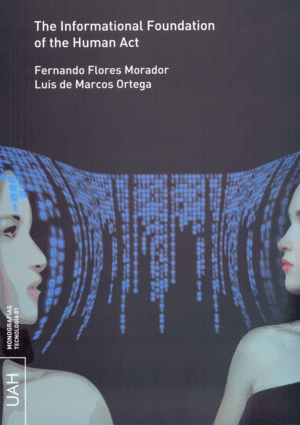The informational foundation of the Human Act
- ISBN: 9788416978618
- Editorial: Universidad Alcalá de Henares (UAH)
- Fecha de la edición: 2018
- Lugar de la edición: Alcalá de Henares. España
- Colección: Monografías. Tecnología
- Encuadernación: Rústica
- Medidas: 24 cm
- Nº Pág.: 130
- Idiomas: Inglés

This book is the result of a collective research effort performed during many years in both Sweden and
Spain. It is the result of attempting to develop a new field of research that could we denominate «human
act informatics.» The goal has been to use the technologies of information to the study of the human
act in general, including embodied acts and disembodied acts. The book presents a theory of the
quantification of the informational value of human acts as order, opposing the living order against
entropy. We present acting as a set of decisions and choices aimed to create order and to impose
Modernity. Karl Popper’s frequency theory of probability is applied to characterize human acts regarding their degree of freedom and to set up a scale of order in human decisions. The traditional theory of economics and social science characterize the human act as rational, utilitarian and ethical. Our results emphasize that the unique significance of an act lies in its capacity to generate order. An adequate methodology is then presented to defend such hypothesis according to which, the rationality respective irrationality of acting, is in fact only a function of the act’s organizational capacity. From this perspective, it has been necessary to define «order» respective «disorder» as operative concepts that allowed the
comparison of the organizational differences generated by each kind of act. According to the presented conclusions, the spontaneity of living, as unconscious thinking, dreaming, loving, etc. and the mainstream of the human acts, are utilitarian, but in an irrational way; they are rooted in unconscious
drifts and therefore must be considered irrationalutility acts.






